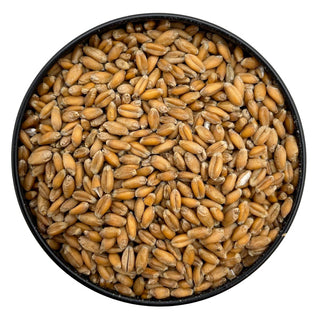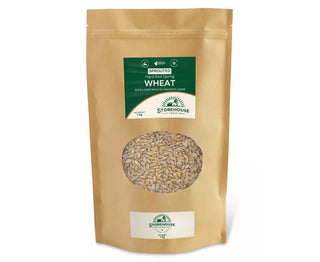Organic Sprouted Hard Red Spring Wheat
- Unit price
- / per
Organic Sprouted Hard Red Spring Wheat
Product of Canada
- High Nutritional Value: Organic sprouted hard red spring wheat is known for its increased nutritional profile compared to its unsprouted counterpart. The sprouting process enhances the availability of vitamins, particularly B vitamins like folate, and minerals such as iron, magnesium, and zinc. This makes it a highly nutritious option for incorporating into diets.
- Improved Digestibility: Sprouting breaks down some of the starches in wheat into simpler sugars, making it easier to digest. Additionally, the process reduces antinutrients like phytic acid, which can inhibit the absorption of minerals. This means that nutrients are more readily available to the body when consumed, making it a suitable option for those with sensitive digestion.
- Rich in Antioxidants: The sprouting process increases the antioxidant content in hard red spring wheat, including important ones like Vitamin E and ferulic acid. Antioxidants are vital for protecting the body against oxidative stress and inflammation, contributing to overall health and the prevention of chronic diseases.
- Versatile Culinary Uses: Organic sprouted hard red spring wheat can be ground into flour and used in a variety of recipes, including bread, pancakes, and muffins. Its slightly nutty flavor enhances the taste of baked goods. It can also be cooked whole and added to salads, soups, and stews, offering a nutritious boost to meals.
- Environmentally Friendly: Organic farming practices promote soil health and biodiversity, making organic sprouted hard red spring wheat a more sustainable choice. These practices avoid the use of synthetic pesticides and fertilizers, reducing pollution and protecting water sources. Choosing organic sprouted grains supports not only personal health but also the health of the planet.
Revolutionize Your Health with Organic Sprouted Hard Red Wheat
For centuries, people wouldn’t eat grains and beans without natural processing like soaking, sprouting and fermenting. Cultures all over the world understood that proper preparation was vital to increase digestibility and nutrient availability. Some cultures passed this wisdom down through generations, while others lost it through industrialization.
Today, sprouting is resurging as more people seek foods prepared in slow and traditional ways. Sprouting offers no shortcuts, so customers trust that they are receiving a wholesome and healthful product.
For many people, unsprouted grains and beans cause digestive discomfort. Sprouting activates starch, protein and lipid degrading enzymes that “pre-digest” seeds. Namely, it converts dense proteins and complex carbs into more digestible amino acids and simple sugars. Despite the starch to sugar conversion, sprouted grains have a very low glycemic index.
All grains also contain nutrient inhibitors to protect valuable nutrients from being utilized until optimal growing conditions are met. Unfortunately, these prevent us from fully absorbing the seed’s nutrients. Sprouting unlocks nutrient inhibitors like phytic acid, depending on the seed and sprouting time. For example, chickpeas sprouted for 48 hours have a 67% decrease in phytic acid. For this reason, sprouted grains, seeds and beans are considered more digestible and bioavailable.
Optimize Baking Performance
- Increase loaf volume
- Softer and fluffier texture than unsprouted whole grains
- Richer and more complex taste profiles
- No bitterness, resulting in a sweeter flavour
- Low glycemic index
- Need less sugar in recipe
- Longer shelf life (over 1 year for flour)
- Bread stales at a slower rate
Storage
Intact grain can be stored for up to 6 months in a cool dry location, or 1 year in a freezer. Once milled, it can be stored in a cool dry location for 3 months or 6 months in a freezer.
Disclaimer: This information is for educational purposes only. It is not intended to diagnose, treat, cure, or prevent any disease. The information provided is for educational purposes only and not intended as medical advice. Consult your professional health expert for medical advice. This product has been packaged in the same facility as wheat, tree nuts, barley, and other potential allergens.
Organic Sprouted Hard Red Spring Wheat
- Unit price
- / per
Adding product to your cart
You may also like
Organic Sprouted Hard Red Spring Wheat
Product of Canada
- High Nutritional Value: Organic sprouted hard red spring wheat is known for its increased nutritional profile compared to its unsprouted counterpart. The sprouting process enhances the availability of vitamins, particularly B vitamins like folate, and minerals such as iron, magnesium, and zinc. This makes it a highly nutritious option for incorporating into diets.
- Improved Digestibility: Sprouting breaks down some of the starches in wheat into simpler sugars, making it easier to digest. Additionally, the process reduces antinutrients like phytic acid, which can inhibit the absorption of minerals. This means that nutrients are more readily available to the body when consumed, making it a suitable option for those with sensitive digestion.
- Rich in Antioxidants: The sprouting process increases the antioxidant content in hard red spring wheat, including important ones like Vitamin E and ferulic acid. Antioxidants are vital for protecting the body against oxidative stress and inflammation, contributing to overall health and the prevention of chronic diseases.
- Versatile Culinary Uses: Organic sprouted hard red spring wheat can be ground into flour and used in a variety of recipes, including bread, pancakes, and muffins. Its slightly nutty flavor enhances the taste of baked goods. It can also be cooked whole and added to salads, soups, and stews, offering a nutritious boost to meals.
- Environmentally Friendly: Organic farming practices promote soil health and biodiversity, making organic sprouted hard red spring wheat a more sustainable choice. These practices avoid the use of synthetic pesticides and fertilizers, reducing pollution and protecting water sources. Choosing organic sprouted grains supports not only personal health but also the health of the planet.
Revolutionize Your Health with Organic Sprouted Hard Red Wheat
For centuries, people wouldn’t eat grains and beans without natural processing like soaking, sprouting and fermenting. Cultures all over the world understood that proper preparation was vital to increase digestibility and nutrient availability. Some cultures passed this wisdom down through generations, while others lost it through industrialization.
Today, sprouting is resurging as more people seek foods prepared in slow and traditional ways. Sprouting offers no shortcuts, so customers trust that they are receiving a wholesome and healthful product.
For many people, unsprouted grains and beans cause digestive discomfort. Sprouting activates starch, protein and lipid degrading enzymes that “pre-digest” seeds. Namely, it converts dense proteins and complex carbs into more digestible amino acids and simple sugars. Despite the starch to sugar conversion, sprouted grains have a very low glycemic index.
All grains also contain nutrient inhibitors to protect valuable nutrients from being utilized until optimal growing conditions are met. Unfortunately, these prevent us from fully absorbing the seed’s nutrients. Sprouting unlocks nutrient inhibitors like phytic acid, depending on the seed and sprouting time. For example, chickpeas sprouted for 48 hours have a 67% decrease in phytic acid. For this reason, sprouted grains, seeds and beans are considered more digestible and bioavailable.
Optimize Baking Performance
- Increase loaf volume
- Softer and fluffier texture than unsprouted whole grains
- Richer and more complex taste profiles
- No bitterness, resulting in a sweeter flavour
- Low glycemic index
- Need less sugar in recipe
- Longer shelf life (over 1 year for flour)
- Bread stales at a slower rate
Storage
Intact grain can be stored for up to 6 months in a cool dry location, or 1 year in a freezer. Once milled, it can be stored in a cool dry location for 3 months or 6 months in a freezer.
Disclaimer: This information is for educational purposes only. It is not intended to diagnose, treat, cure, or prevent any disease. The information provided is for educational purposes only and not intended as medical advice. Consult your professional health expert for medical advice. This product has been packaged in the same facility as wheat, tree nuts, barley, and other potential allergens.







